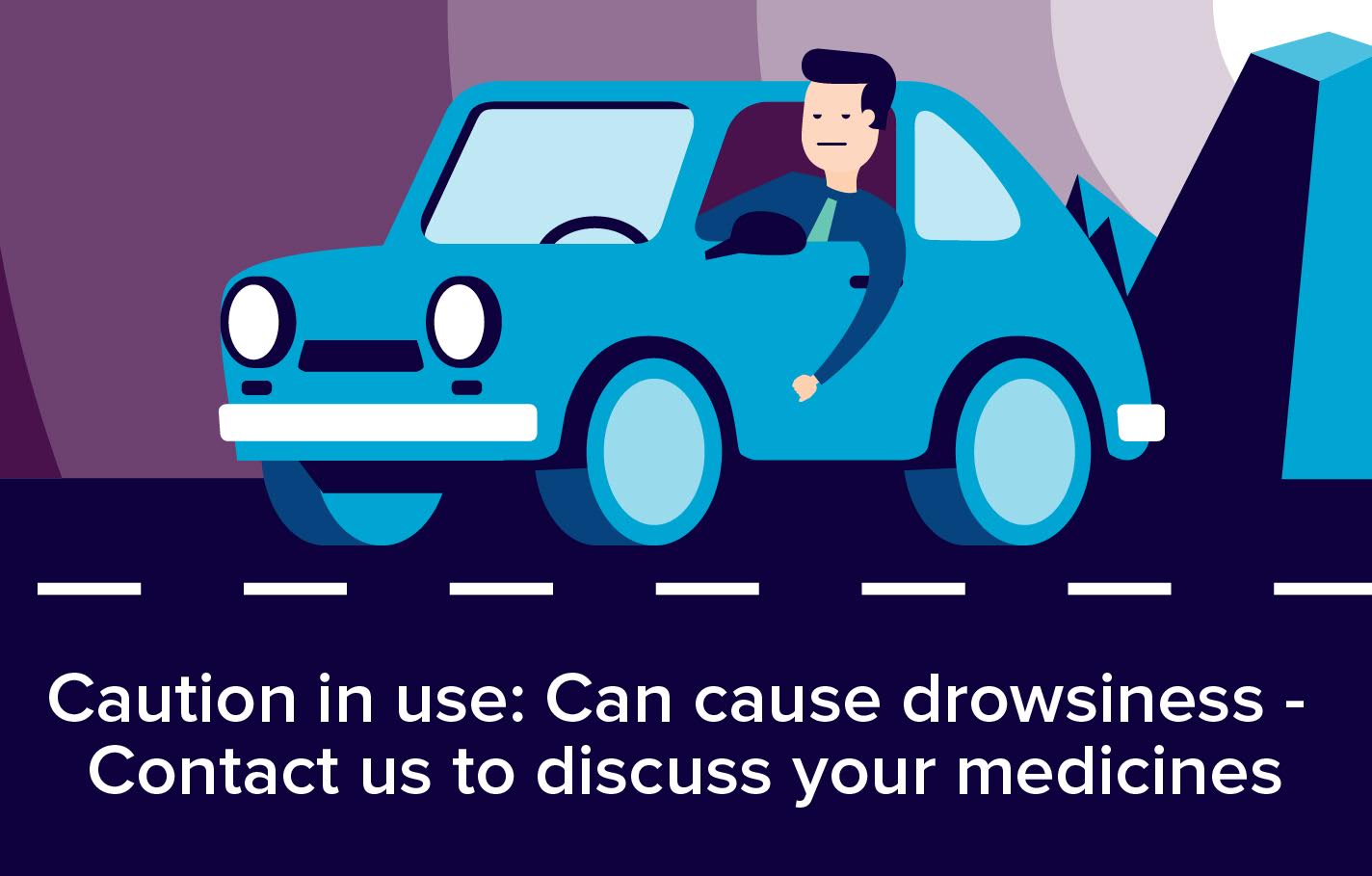Piriton tablets, Piriton allergy tablets and Piriton syrup all contain the active ingredient chlorphenamine maleate, which is a type of medicine called a sedating antihistamine. Chlorphenamine works by preventing the actions of histamine.

How does Piriton work?
- Histamine is a substance produced by the body as part of its defence mechanisms. It is stored in cells called mast cells, in almost all tissues of the body. When the body reacts to a foreign substance (known as an allergen, eg flower pollen, pet fur), the mast cells are stimulated by the allergen and release their stores of histamine.
- The released histamine then binds to its receptors (H1 receptors), causing a chain reaction that results in allergic symptoms.
What is Piriton used for?
- Relieving the symptoms of allergic conditions such as hayfever, nettle rash (urticaria), food allergies and reactions to insect bites or medicines.
- Relieving the symptoms of a more serious allergic reaction called angioneurotic oedema, which causes swelling of the eyes, lips, tongue or throat.
- Relieving itching associated with chickenpox.
Before taking Piriton
Before taking Piriton make sure your doctor, dentist or pharmacist knows:
- If you are pregnant, trying for a baby or breast-feeding.
- If you have glaucoma.
- If you have prostate problems, or have been experiencing difficulty passing urine.
- If you know you have a blockage in your small intestines.
- If you have liver problems.
- If you have epilepsy.
- If you are taking other medicines, including those available to buy without a prescription, herbal and complementary medicines.
- If you have ever had an allergic reaction to an antihistamine or to any other medicine.
How to take Piriton
- Before starting this treatment, read the manufacturer's printed information leaflet from inside the pack.
- Take Piriton exactly as your doctor advises you. You will be told how many doses to take each day.
- It is not important whether you take your doses before or after food.
- If you forget to take a dose, do not worry, take your next dose when it is due. Do not take two doses together to make up for a forgotten dose.
Getting the most from Piriton
- Piriton may make you sleepy. If this happens, do not drive or use tools or machines, and do not drink alcohol.
- If you buy any medicines, check with a pharmacist that they are safe to take alongside Piriton.
- If you are having an operation or dental treatment, tell the person carrying out the treatment that you are taking an antihistamine.
Use with caution in
- Elderly people (who are more prone to side effects so a lower maximum dose is recommended).
- Children (who are also more prone to potential side effects).
- Asthma.
- Bronchitis.
- People with widening of the airways, which may be hereditary or due to infection (bronchiectasis).
- Men with an enlarged prostate gland (prostatic hypertrophy).
- People who have difficulty passing urine.
- People with raised pressure in the eye or glaucoma.
- Epilepsy.
- Liver disease.
- People with severe cardiovascular disease.
- People with very high blood pressure (severe hypertension).
- People with an overactive thyroid gland (thyrotoxicosis).
Not to be used in
- People who have taken a type of antidepressant called a monoamine oxidase inhibitor (MAOI, eg phenelzine, tranylcypromine or isocarboxazid) in the last 14 days.
- Piriton tablets and Piriton allergy tablets contain lactose and are not suitable for people with rare hereditary problems of galactose intolerance, Lapp lactase deficiency or glucose-galactose malabsorption.
- Piriton syrup contains sucrose and is not suitable for people with rare hereditary problems of fructose intolerance, glucose-galactose malabsorption or sucrose-isomaltase insufficiency.
This medicine should not be used if you are allergic to one or any of its ingredients. Please inform your doctor or pharmacist if you have previously experienced such an allergy.
If you feel you have experienced an allergic reaction, stop using this medicine and inform your doctor or pharmacist immediately.
Side effects
Medicines and their possible side effects can affect individual people in different ways. The following are some of the side effects that are known to be associated with this medicine. Just because a side effect is stated here, it does not mean that all people using this medicine will experience that or any side effect.
Very common (affect more than 1 in 10 people)
Common (affect between 1 in 10 and 1 in 100 people)
- Blurred vision.
- Dry mouth.
- Feeling sick.
- Difficulty concentrating.
- Problems with coordination.
- Dizziness.
- Headache.
- Fatigue.
Unknown frequency
- Loss of appetite.
- Disturbances of the gut such as indigestion, diarrhoea, constipation, vomiting or abdominal pain.
- Increased energy, restlessness or nervousness (children and elderly people are more susceptible to these types of side effect).
- Confusion.
- Irritability.
- Nightmares.
- Awareness of your heartbeat (palpitations).
- Increased heart rate.
- Abnormal heartbeats (arrhythmias).
- Sensation of ringing or other noise in the ears (tinnitus).
- Low blood pressure.
- Thickening of the mucus in the lungs.
- Chest tightness.
- Inflammation of the liver (hepatitis) or jaundice.
- Skin reactions such as rash, hives or increased sensitivity to sunlight.
- Difficulty passing urine (urinary retention).
- Muscle twitching or weakness.
The side effects listed above may not include all of the side effects reported by the medicine's manufacturer.
For more information about any other possible risks associated with this medicine, please read the information provided with the medicine or consult your doctor or pharmacist.
How can Piriton affect other medicines?
It is important to tell your doctor or pharmacist what medicines you are already taking, including those bought without a prescription and herbal medicines, before you start treatment with this medicine. Similarly, check with your doctor or pharmacist before taking any new medicines while taking this one, to make sure that the combination is safe.
You should not use other antihistamines in combination with this medicine. Some cough and cold medicines contain antihistamines, so always check with your pharmacist before taking other medicines in combination with this one.
This medicine should not be used by people who have taken a type of antidepressant called a monoamine oxidase inhibitor (MAOI) in the last 14 days. This is because side effects such as blurred vision, dry mouth, drowsiness or constipation may be intensified by MAOIs. MAOIs include phenelzine, isocarboxazid and tranylcypromine. For more information ask your pharmacist.
There may be an increased risk of drowsiness and sedation if this medicine is taken with any of the following (which can also cause drowsiness):
- alcohol
- antipsychotics, eg haloperidol, chlorpromazine
- barbiturates, eg phenobarbital, amobarbital
- benzodiazepines, eg diazepam, temazepam
- other sedating antihistamines, eg hydroxyzine, promethazine
- sleeping tablets, eg zopiclone
- strong opioid painkillers, eg morphine, codeine, tramadol
- tricyclic antidepressants, eg amitriptyline, nortriptyline.
There may be an increased risk of side effects such as dry mouth, blurred vision, urine retention and constipation if Piriton is taken with antimuscarinic medicines that can cause these type of side effects, such as the following:
- antimuscarinic medicines for Parkinson's symptoms, eg procyclidine, orphenadrine, trihexiphenidyl
- antimuscarinic medicines for urinary incontinence, eg oxybutynin, flavoxate, tolterodine, propiverine, trospium
- some antipsychotics, eg chlorpromazine, clozapine
- antispasmodics, eg hyoscine, atropine
- tricyclic antidepressants, eg amitriptyline, imipramine.
Piriton may oppose the effect of histamine (used to treat leukaemia) and is not recommended for people having this treatment.
Piriton may also oppose the effect of betahistine (used to treat Ménière's disease).
Piriton may increase the blood level of the antiepileptic medicine phenytoin.
How to store Piriton
- Keep all medicines out of the reach and sight of children.
- Store in a cool, dry place, away from direct heat and light.
If you have any more questions please ask your Pharmacist.
Remember to keep all medicines out of reach of children
Please Note: We have made every effort to ensure that the content of this information sheet is correct at time of publish, but remember that information about drugs may change. This sheet does not list all the uses and side-effects associated with this drug. For full details please see the drug information leaflet which comes with your medicine. Your doctor will assess your medical circumstances and draw your attention to any information or side-effects which may be relevant in your particular case.
References:
http://www.patient.co.uk/medicine/Chlorphenamine.htm
http://www.netdoctor.co.uk/allergy-and-asthma/medicines/piriton.html
http://www.piriallergy.com/piri-range/piriton.aspx
http://www.piriallergy.com/piri-range/piriton/piriton-allergy-tablets.aspx
http://www.nhs.uk/medicine-guides/pages/selectorshow.aspx?medicine=Piriton
http://en.wikipedia.org/wiki/Chlorphenamine
http://www.mims.com/Singapore/drug/info/Piriton/



